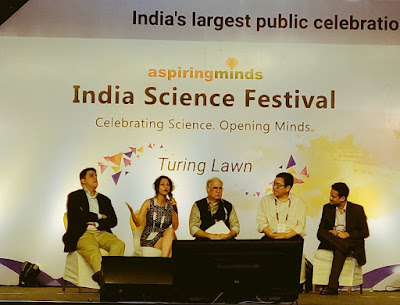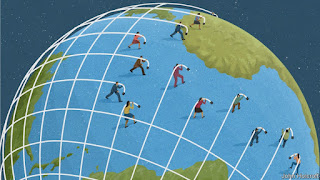Delivered a keynote on Automating Culture
The talk was about how the art world has
entered the platform economy. The art industry is being subjected to similar
fears and possible opportunities of automation as other cultural industries
such as the music, film and the publishing business. Hence, it asks some key
questions: Can the traditional art intermediaries still compete in the platform
economy as data mining companies enter the fray? Has the divide between the
high and the popular culture collapsed as user behavior, platform design and
engineering staff circulate between these worlds? Do customers no longer care
about the aura of the art piece before buying it online? In other words,
...do
algorithms rule today and are they making the art world more democratic?
With the rise of automation and
platformization, the International Art Market
Studies Association (TIAMSA) second international conference
organized itself around the theme and key question of, “Art for the People?
Questioning the Democratization of the Art Market.”
The call reflects some of the
contemporary issues and debates taking place in the art world nowadays. The art
world and the market have traditionally been the domain of the elites and have
thrived on exclusivity. However, the art world has arguably become much more
democratic in recent years thanks to the digital revolution, the inclusion of
emerging economies in the world art market system, and the vastly improved
access to art and information. The price histories of works of art can nowadays
easily be reconstructed using online databases; the threshold for art buying is
significantly lowered by online sales platforms; and new buyers in emerging
economies are making the art market much less Western-oriented. Moreover, an
ever broader range of artworks in different price categories has put (fine) art
within reach of the middle classes across the globe. At the same time, art
institutions such as museums are under tremendous pressure to be less
exclusive. Some of these democratizing tendencies are of course not new. For
instance, publishing houses in Europe started disseminating prints on a massive
scale already in the sixteenth century, thereby enabling larger segments of the
population to acquire images. Whether or not the internet and globalization are
genuine game changers in the contemporary art world, we can assume that new
platforms through which art is mediated – both offline and online – are
reconstituting the manner in which art is being viewed, valorized, acquired and
enjoyed. These developments could have far reaching implications.
TIAMSA’s second annual conference
explored to what extent the art market was affected by comparable developments
in the past, how it is embracing today’s democratic potential, and at what
cost. Are digital innovations, from search engines and big data analytics to
virtual auctions, transforming the long-existing modus operandi of the art
world and the traditional structure of the art market? And if the art market is
indeed living up to its democratic promise, is it also becoming less opaque and
therefore more transparent?
 This event was held in Vienna from
Thursday 27 Sept – Saturday 29 Sept
2018. It was the result of a joint collaboration of the Belvedere ResearchCenter, the Dorotheum and the Department of Art History at Vienna University. The
conference presented a selection of papers approaching the theme from
different, fascinating viewpoints, and combined it with two special events,
namely a guided tour of Viennacontemporary, Austria’s international art fair,
and a tour of the Belvedere Research Center. There was also a round table on the
art market and the internet.
This event was held in Vienna from
Thursday 27 Sept – Saturday 29 Sept
2018. It was the result of a joint collaboration of the Belvedere ResearchCenter, the Dorotheum and the Department of Art History at Vienna University. The
conference presented a selection of papers approaching the theme from
different, fascinating viewpoints, and combined it with two special events,
namely a guided tour of Viennacontemporary, Austria’s international art fair,
and a tour of the Belvedere Research Center. There was also a round table on the
art market and the internet. 




Comments
Post a Comment